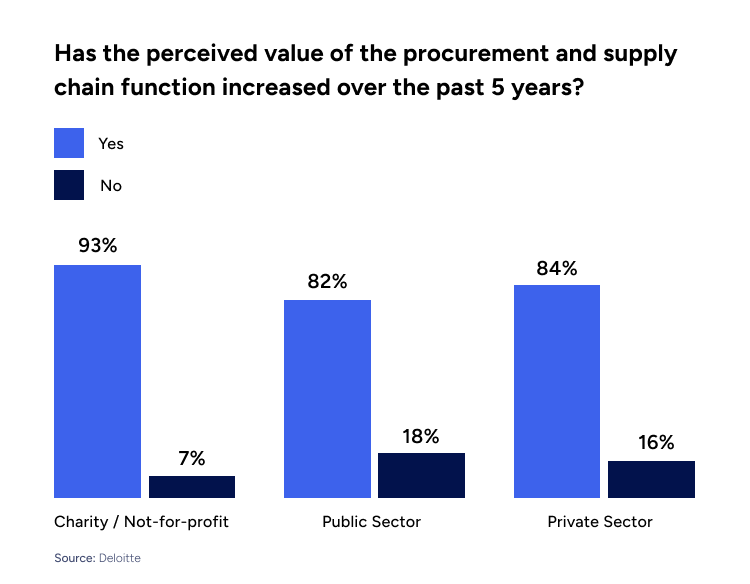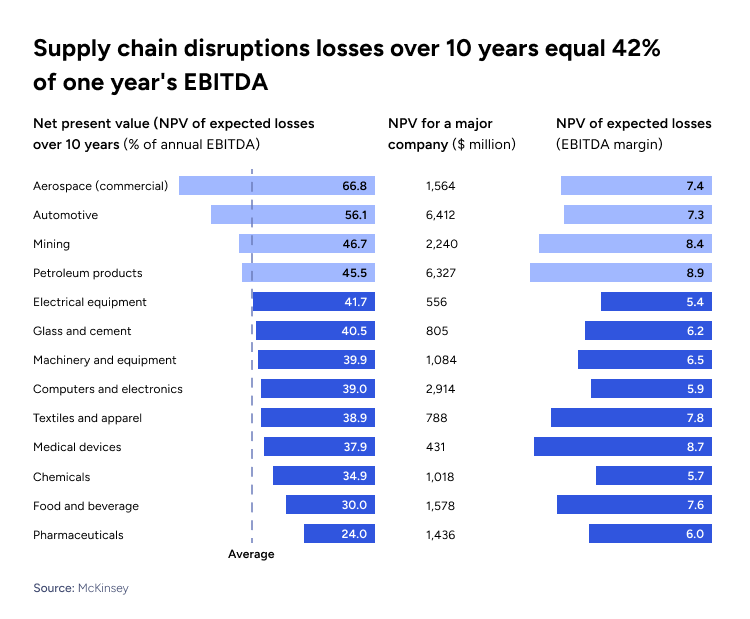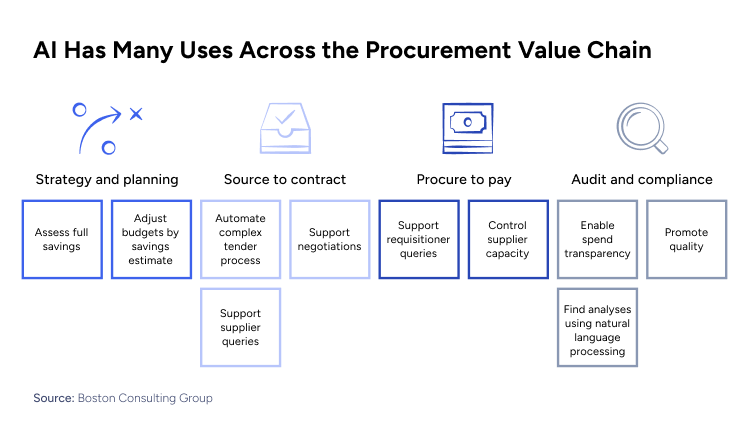The Evolving Role of Procurement Consultants



Procurement consultants help organizations streamline their procurement processes, manage supply chains, and implement cost-saving strategies. Today, procurement functions account for 50% to 80% of a company's total costs, underscoring the potential impact of effective procurement strategies.
Procurement consultants are indeed becoming more important than ever. Not only do they assist companies in reducing costs but also enhancing supplier performance and driving innovation through strategic sourcing and supplier relationship management. As global markets face unprecedented challenges and disruptions, the role of procurement consultants has evolved to address these new realities.
In this article, we will explore the evolving role of procurement consultants, answering these questions:
- How do procurement consultants help build resilience in supply chains amidst global disruptions?
- What role do procurement consultants play in managing shrinking margins due to inflation and recession?
- How do procurement consultants leverage technological advancements like AI, IoT, and blockchain to transform procurement practices?
The Importance of Procurement Consultants for Organizations
Procurement consultants have become pivotal for organizations aiming to optimize their supply chain operations and save costs. In fact, top-performing procurement functions can reduce costs by up to 12%, enhance supplier performance, and drive innovation through strategic sourcing and supplier relationship management.
Executives seem to recognize the need for a more proactive and strategic approach to procurement and resilience, with the perceived value of procurement that soared in the past five years:

In an era characterized by volatility, regionalized supply chains, and technological advancements, procurement consultants help organizations navigate complex market conditions. In particular, three key trends can be identified that are reshaping the market.
Trend #1: Increasing Resilience in an Era of Supply Chain Disruptions.
Geopolitical tensions and natural disasters have disrupted supply chains globally, increasing the need for resilient and adaptive procurement strategies. The McKinsey Global Institute estimates that supply chain disruptions can lead to an average loss of 42% of annual earnings, with industries such as aerospace, automotive, and mining, being the most affected.

Recent geopolitical tensions, including US-China trade disputes, the instability of the COVID-19 pandemic, and Russia's invasion of Ukraine, have significantly impacted commercial operations. The BlackRock Geopolitical Risk Indicator shows elevated risk levels, impacting companies’ performance and mining supply chain resilience in globally integrated markets. For instance, the war in Ukraine caused a 5,000% increase in neon gas prices, essential for semiconductor production, exacerbating global semiconductor shortages in 2020 and impacting the overall value chain.
Moreover, the frequency of natural disasters has increased five-fold over the past 50 years due to climate change. The UNDRR's 2022 Global Assessment Report predicts natural disasters will rise to 560 occurrences per year by 2030. Natural disasters resulted in worldwide economic losses totaling $343 billion from 2000 through 2021. In fact, they damage commercial property, assets, and raw materials, disrupt resource availability, shipping, and production quality.
In the face of significant supply chain disruptions caused by geopolitical events, natural disasters, or pandemics, procurement consultants help organizations develop contingency plans, diversify supply sources, and enhance supply chain resilience. For example, during the COVID-19 pandemic, companies that engaged procurement consultants to manage supply chain disruptions reported a 30% faster recovery in their supply chains.
The Role of Procurement Consultants in Building Resilience
Procurement consultants play a crucial role in enhancing organizational resilience against supply chain disruptions, as evidenced by a 2022 Deloitte survey on procurement and supply chain resilience. In response to global events such as the COVID-19 pandemic, trade barriers, and geopolitical instability, 74% of procurement professionals across sectors report that their functions have demonstrated resilience.
Companies increasingly invest in dual or multi-sourcing strategies to diversify risk within their strategic spending categories, a practice adopted by 70% of private and 63% of public sector respondents. Additionally, 38% of organizations have entered new supply markets to mitigate supply continuity risks.
Despite these efforts, only 13% of respondents have a fully mapped supply chain network, indicating significant room for improvement in supply chain visibility beyond Tier 2 suppliers. Consultants can enhance procurement resilience through:
- Managing Volatility: Consultants assess exposure to macroeconomic drivers like interest rates and commodity prices, coordinate responses, and maintain an updated playbook with scenario planning for cost control as inflation fluctuates.
- Creating an RFP Engine: Consultants can develop an RFP engine by prioritizing categories and suppliers based on market development. Additionally, it helps in spend analysis and supplier leverage, focusing on areas with the highest potential to drive value while deprioritizing less beneficial categories.
- Redesigning Value Creation with Key Suppliers: Consultants can facilitate design-to-cost collaborations, partner with suppliers, and directly invest in scaling critical supply chains. This includes acting as knowledge brokers to create value from both external supplier partnerships and internal cross-functional collaborations, following the Collective Approach to procurement.
Case Study: Procurement Cost Reduction for Leading Swiss Consumer Goods
A leading consumer goods multinational headquartered in Switzerland faced challenges in optimizing its supplier base and reducing procurement costs. Consultport proposed two candidates, and the client selected a former BCG consultant with expertise in procurement optimization. The consultant, after careful analysis, proposed to develop an automated RFP engine.
The approach involved conducting a detailed spending analysis to identify high-impact categories, assessing market development and supplier leverage, and creating a prioritized list of categories and suppliers. The consultant's work led to a 15% reduction in procurement costs, a 20% increase in supplier performance scores, and a 30% improvement in contract compliance rates.
Trend #2: Inflation and Recession Are Shrinking Margins.
The persistent inflation and recession are impacting procurement operations. Inflation has led to soaring input prices, with companies experiencing up to a 25% increase in costs for critical packaging and up to 275% in ocean freight rates.
BCG's analysis of the top 100 companies in the S&P 500 Retail Index showed an average margin compression of 194 basis points between the second quarters of 2021 and 2022, emphasizing the need for robust procurement strategies. For instance, in the automotive sector, the cost of rubber surged by 30% due to rising crude oil prices and freight rates, severely impacting manufacturers' margins. The need for rapid adjustments has been critical, where companies that delayed decision-making saw prices rise by nearly 50% within two months, leading to substantial financial losses.
Many firms are shifting towards local operations to reduce risks, with 35% already on-shoring their supply chains and another 42% planning to do so. To mitigate these challenges, procurement leaders increasingly focus on enhancing transparency, employing advanced data analytics, and fostering cross-functional collaboration.
The Role of Procurement Consultants in Managing Inflation
Procurement consultants add significant value in managing inflation by leveraging new advanced tools to help maintain cost control and operational efficiency. While still useful, “should-cost” modeling tools and competitive bidding practices become less effective when input costs are soaring at double-digit rates and supply is constrained.
Recent trends highlight their critical role in navigating economic uncertainties:
- Creating Transparency and Real-Time Visibility: Procurement consultants enhance transparency across the supply chain, which is crucial for managing inflation. For example, they might set up a digital "resilience cockpit" that integrates internal and external data sources to continuously monitor risks related to critical materials and inflation exposure. This allows companies to react swiftly to emerging risks, ensuring better decision-making and cost management.
- Implementing new sourcing strategies: Techniques such as parametric pricing, consortium buying, and index-based pricing are used to manage costs more effectively. For instance, a procurement team might customize index-based adjustments for different raw material segments, enabling significant cost savings and reducing the impact of price volatility. By tailoring these strategies to specific materials and market conditions, consultants ensure that companies can maintain more stable pricing structures.
- Aligning Supplier Pricing with Market Conditions: Procurement consultants ensure all stakeholders are aligned on outcomes, in case of engineering redesigns or new supplier approvals. They improve data visibility with finance and commercial teams to adjust budgets. Establishing cross-functional teams is essential for executing seamlessly, from simpler actions as internal controls to limit item usage, to more complex ones, like value engineering for cost reduction in machined parts.
Case Study: Margin Optimization for Procurement Department of Leading Automotive Manufacturer
In a recent Consultport project, a leading automotive manufacturer based in Germany faced significant procurement challenges due to rising costs of raw materials, particularly steel and rubber, which impacted their profit margins. The company engaged a former McKinsey consultant with extensive experience in the automotive sector and a background in strategic sourcing and supply chain optimization.
The consultant first conducted a thorough audit of the company’s procurement practices and identified inefficiencies in supplier negotiations and contract terms. They introduced a strategic supplier diversification plan, which included sourcing alternative materials and leveraging regional suppliers to reduce dependency on high-cost imports. The consultant worked closely with the CPO, establishing a nerve center with cross-functional teams from the engineering, finance, and supply chain departments to introduce index-based pricing and to optimize material usage.
As a result, the company realized a 12% reduction in raw material costs and a 25% improvement in procurement cycle times. Supplier performance metrics showed a 20% increase in reliability and quality, leading to more stable production schedules and improved product margins
Trend #3: Technological Advancements: AI, IoT, Blockchain.
Technological advancements, particularly in AI and machine learning, are transforming procurement practices. 50% of organizations will support supplier contract negotiations using Artificial Intelligence (AI)-enabled contract risk analysis and editing tools. Moreover, 58% of procurement leaders are implementing, or plan to implement, AI in the next 12 months.
These technologies streamline workflows, reduce human error, and augment decision-making. The applications include automating contracts or request-for-proposal generation and forecasting demand. Moreover, some leading companies as Walmart, Emerson, and Corning have started using blockchain with their supply chain partners to gain end-to-end visibility

The Role of Procurement Consultants in Embedding Technology
Procurement Specialists play a pivotal role in helping organizations embed advanced technologies within procurement functions by leveraging next-generation analytics, AI, and digital tools to optimize operations through:
- Enhancing Data Visibility and Analytics: Consultants can implement advanced analytics and AI to improve data visibility and decision-making. For instance, leveraging Electronic invoicing software can drastically reduce invoice processing time, enhancing efficiency and accuracy in procurement operations.
- Streamlining Procurement Processes: By deploying modern enterprise data management systems and integrating tools like eRFX and contract AI, consultants can streamline procurement workflows. This improves compliance and enhances contract management, by automatically flagging non-compliance and potential value leakages, recognized as business-critical by 90% of procurement leaders.
- Implement Advanced Analytics, AI, and Blockchain technology: Consultants embed AI-driven predictive analytics for commodity forecasting and risk assessment, achieving a 20% reduction in procurement costs and a 25% improvement in supply chain efficiencies. Moreover, implementing blockchain technology helps to gain end-to-end supply chain visibility, resulting in a significant reduction in value leakages.
Case Study: Digital Procurement for a Global Electronics Manufacturer
A global electronics manufacturer based in India recently engaged Consultport, as it was struggling with lengthy 25-day invoice processing times, non-compliance issues, and a lack of transparency with their Tier 2 and 3 suppliers. The client engaged a former Deloitte consultant with 15 years of experience in digital procurement transformation for Fortune 500 companies.
The consultant introduced advanced Electronic invoicing software, cutting invoice processing time to just 6-7 days. They deployed contract AI tools, enhancing compliance by automatically flagging non-compliance and potential value leakages. To do so, the consultant facilitated blockchain adoption for end-to-end supply chain visibility, resulting in a 30% reduction in value leakages and improved transparency. Overall, the project led to a 15% reduction in procurement costs.
Why Hiring a Freelance Procurement Consultant
The procurement industry faces a significant talent gap exacerbated by the rapid adoption of new technologies and the aftermath of the pandemic. 30% of C-suite and board-level executives identify attracting and retaining talent as a top issue affecting procurement, and 39% cite the difficulty in building and retaining skills as a major barrier. Additionally, only 41% of procurement teams possess the necessary skills to adopt new technologies.
Hiring freelance procurement consultants can effectively bridge this talent gap. These experts bring specialized expertise and flexibility, offering immediate solutions without the long-term commitment of full-time hires.
Consultport procurement consultants stand out in this landscape by providing top-tier talent vetted through a rigorous selection process. With a network of over 10,000 highly skilled consultants, Consultport ensures that procurement needs are met with unparalleled expertise. These consultants have an average of 15 years of experience and a track record of delivering results in Fortune 500 companies. By partnering with Consultport, businesses gain access to professionals who can drive procurement strategies forward, ensuring seamless adoption of new technologies and filling critical skill gaps efficiently.
Consultport procurement consultants provide tailored and added value by implementing cost-saving measures through detailed spend analysis and cost modeling, negotiating favorable contract terms with suppliers, and centralizing and digitizing procurement data for enhanced decision-making. They optimize entire supply chains and procurement departments by identifying inefficiencies and leveraging market trends to keep procurement strategies current and competitive.
Want to know more? Find the best Procurement Consultants
Conclusion
Procurement consultants are vital in today's business environment. Their expertise in building supply chain resilience, managing shrinking margins, and leveraging advanced technologies like AI, IoT, and blockchain in chosen procurement management platform, provides organizations with the tools they need to navigate complex challenges. By implementing strategic sourcing, enhancing supplier relationships, and integrating cutting-edge technologies, procurement consultants drive significant cost savings and operational efficiencies.
Additionally, the rise of freelance procurement consultants offers organizations a flexible and efficient solution to bridge the talent gap. Freelance consultants bring specialized expertise and can be engaged on a project basis. This allows companies to adapt quickly to changing needs without the long-term commitment of full-time hires. This approach ensures that businesses can access top-tier talent to optimize procurement strategies and implement innovative solutions.
As companies face ongoing disruptions and economic uncertainties, the role of procurement consultants will continue to evolve, offering indispensable support in optimizing procurement functions.

Rajiv is a procurement consultant with experience at Inverto. He specializes in optimizing procurement processes and organization with focus on cost savings and reduction of supply-chain risks. Rajiv has successfully managed over four supplier transfers and site relocations. He advises mid-market companies on enhancing operational performance through process redesign in sourcing, logistics and supply chain.

on a weekly basis.


